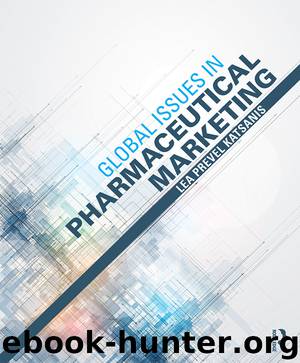Global Issues in Pharmaceutical Marketing by Lea Prevel Katsanis

Author:Lea Prevel Katsanis [Lea Prevel Katsanis]
Language: eng
Format: epub
ISBN: 9781136313257
Publisher: Routledge
Industry-Sponsored Clinical Trial Publications
A key component of the marketing materials distributed to physicians (in hard copy or electronically) is the evidence that supports the efficacy and side effect claims made for a particular brand: the clinical trial. The foundation of the research presented to physicians during the initial marketing efforts of a new drug are the Phase III trials: these are double-blind, randomized trials in controlled, experimental settings that are designed to show a drug’s efficacy and safety when compared to a placebo. After a drug is launched, Phase IV or PMS trials are presented to physicians and are viewed as helpful in developing marketing strategies (Mauriello, 2010). It should be noted that while these terms are used interchangeably in both the scientific and business literature, not all Phase IV studies are PMS studies. Typically, PMS studies have more to do with drug safety and the monitoring of side effects, whereas Phase IV studies are more concerned with either new indications for a drug or competitor drug comparisons. Given this distinction, any clinical study conducted post-launch may compare a drug to a competitor; measure a drug’s outcomes and patient adherence; and review drug safety, drug cost-effectiveness, and drug performance in a natural ‘field’ environment versus an experimental setting (van Thiel & van Delden, 2008). Many countries, including Japan, the Philippines, India, and Germany, all have regulatory requirements that include PMS trials for use in safety and adverse reaction monitoring, as well as any change in dosing (Suvarna, 2010).
It is expected and assumed that all clinical trials are conducted based on sound scientific practices with the appropriate use of data methods because these trials are the basis for evidence-based medicine and practice guidelines. The industry’s position is that all clinical trials are conducted in an ethical and rigorous manner. However, some research suggests that there is bias in industry studies that favors the companies sponsoring the research (Lexchin et al., 2003). The authors report that while industry studies were of good quality, the sponsored studies were more likely to favor the company and they were less likely to be published than studies from other sources. A later study by Turner et al. (2008) suggests that there is selective publication of clinical trials that may lead to erroneous opinions about the effectiveness and riskiness of drugs—in other words, studies that do not have the desired outcome may never be submitted for publication.
The industry and some physicians believe that Phase IV studies are valuable because they present different information for drugs that are not ‘first-in-class’; they look at different end points other than just safety and efficacy; and they provide a ‘real world’ view of the drug versus the artificial setting of Phase III trials (Tunnah, 2011). Polygenis (2005) suggests that trials that measure outcomes and health economics issues cannot be conducted in the experimental setting which is used for other types of Phase IV trials because of the nature of the variables being measured. Critics of Phase IV trials argue that there
Download
This site does not store any files on its server. We only index and link to content provided by other sites. Please contact the content providers to delete copyright contents if any and email us, we'll remove relevant links or contents immediately.
Life 3.0: Being Human in the Age of Artificial Intelligence by Tegmark Max(5546)
The Sports Rules Book by Human Kinetics(4379)
The Age of Surveillance Capitalism by Shoshana Zuboff(4274)
ACT Math For Dummies by Zegarelli Mark(4043)
Unlabel: Selling You Without Selling Out by Marc Ecko(3658)
Blood, Sweat, and Pixels by Jason Schreier(3611)
Hidden Persuasion: 33 psychological influence techniques in advertising by Marc Andrews & Matthijs van Leeuwen & Rick van Baaren(3552)
The Pixar Touch by David A. Price(3431)
Bad Pharma by Ben Goldacre(3421)
Urban Outlaw by Magnus Walker(3392)
Project Animal Farm: An Accidental Journey into the Secret World of Farming and the Truth About Our Food by Sonia Faruqi(3212)
Kitchen confidential by Anthony Bourdain(3079)
Brotopia by Emily Chang(3047)
Slugfest by Reed Tucker(2997)
The Content Trap by Bharat Anand(2917)
The Airbnb Story by Leigh Gallagher(2851)
Coffee for One by KJ Fallon(2630)
Smuggler's Cove: Exotic Cocktails, Rum, and the Cult of Tiki by Martin Cate & Rebecca Cate(2518)
Beer is proof God loves us by Charles W. Bamforth(2452)
